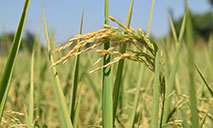Tibet takes advantage of its competitive industries to stride towards rural vitalization
Southwest China's Tibet Autonomous Region has accomplished the historical feat of eradicating absolute poverty. In a bid to consolidate such achievements and embark on a path of rural vitalization, the region has made full use of its competitive industries.

Photo taken on Sept. 6, 2021 shows the ripe highland barley in Lhunzhub County of Lhasa, capital of southwest China's Tibet Autonomous Region. (Xinhua/Jigme Dorje)
The industries that Tibet has utilized to shake off poverty include planting. Due to its harsh natural environment, green plants used to be difficult to grow in Ngari Prefecture, also nicknamed as the “top of the roof of the world”.
However, determined to bring a change to the barrenness of his hometown, an 86-year-old man named Tsepal Dakpa experimented with planting Salix bangongensis in Recho village of Rutog county in Ngari several years ago, in spite of opposition from his fellow villagers.
Dakpa’s efforts paid off. In recent years, saplings of Salix bangongensis cultivated in the region can generate revenues of 4 million yuan ($622,000) annually when sold to other counties within the prefecture.
At an ecological-agricultural industrial park built in 2017 in Gar county of Tibet, greenhouse-grown vegetables such as cucumber and green beans have been cultivated successfully. Equipped with thermal lamps, mist spray appliances and hydroponic culture facilities, the industrial park has greatly alleviated the difficulty locals faced when purchasing vegetables transported in from other regions.
In addition to the planting sector, animal husbandry and the marketing of local featured products have also helped Tibetan residents add to their family income.
For instance, a featured product development company in Lhorong county of Tibet signed acquisition contracts with more than 1,000 highland barley growers at a price higher than the market price, generating an additional income of 1,200 yuan per household.
"During peak seasons for the acquisition of highland barley, there were long queues of farmers who drove a long way to sell the products every day," said Tsering Dondrup, general manager of the company, adding that "we now supply 300,000 bags of biscuits made from roasted barley flour to Tibet Airlines every year".
Photos
 Bumper harvest presents a magnificent scene of terraced rice paddies in SW China's Luzhou city
Bumper harvest presents a magnificent scene of terraced rice paddies in SW China's Luzhou city In pics: life of Siberian tigers in NE China's breeding center
In pics: life of Siberian tigers in NE China's breeding center Explore wonderland created by an alpine lake cluster in SW China's Yunnan
Explore wonderland created by an alpine lake cluster in SW China's Yunnan In pics: Museums across China unveil creative and culturally-inspired mooncakes
In pics: Museums across China unveil creative and culturally-inspired mooncakes
Related Stories
- Flourishing nursing services tend elderly Tibetans in NW China
- Tibet, 40 hours to see - Chapter Three: The Last Piece of Unpolluted Land
- Tibet to launch tourist route featuring countryside experience
- Interview: Japanese expert hails qualitative leap in China's Tibetan studies
- Young entrepreneurs in SW China’s Tibet help improve local people’s lives through traditional carpets
Copyright © 2021 People's Daily Online. All Rights Reserved.






